#atlantic council
Explore tagged Tumblr posts
Text

Analysis from Nicholas Blanford on why Apartheid Israel's invasion of Gaza may still not lead to a regional war
#free gaza#free palestine#gaza strip#irish solidarity with palestine#palestine#gaza#news on gaza#al jazeera#boycott israel#israel#Nicholas Blanford#Atlantic Council#Analysis#lebanon#hezbollah
4 notes
·
View notes
Text
Blinken saves his criticism of Israel for the bitter end
youtube
Blinken admits Hamas recruited as many fighters as it lost during US-backed Israeli bombardment.
Secretary of State Antony Blinken gave his farewell speech to the Atlantic Council, where he admitted that Hamas “cannot be defeated by a military campaign alone,” and that according to U.S. assessments, “Hamas has recruited almost as many new militants as it has lost.”
Blinken said Israel’s bombardment of the Gaza Strip has become “a recipe for an enduring insurgency and perpetual war.” But that was the goal all along. The goal was never to defeat Hamas, and it was always ethnic cleansing of the Palestinian people.
The more Israel bombs Gaza, the more support there is for the resistance, and as long as a resistance exists, Israel has an enemy to continue to fight and an excuse to keep the war going.
The only difference right now seems to be that the U.S. and Israel are moving into the next phase, as they announce a ceasefire and hostage release deal with Hamas, and the incoming Trump administration works to turn the focus to regional normalization.
#Youtube#Rachel Blevins#Antony Blinken#Blinken complicit in genocide#Atlantic Council#Hamas#goal never to defeat Hamas#Hamas cannot be defeated#enduring insurgency#perpetual war#ethnic cleansing of Palestinians#hostage release deal#Trump administration#regional normalization#Israel bombs Gaza#support for resistance#forever wars
0 notes
Text
DAL BACIO IN FRONTE DI BIDEN AL PREMIO DELL'ATLANTIC COUNCIL
di Redazione Giorgia Meloni premiata dall’Atlantic Council con il Global Citizen Awards. Come negli anni Venti e Trenta quando gli Stati Uniti e le loro banche, come la J.P. Morgan, la Union Banking Corporation di Prescott Bush e i petrolieri Rochefeller USA finanziarono Mussolini e ne esaltavano le doti politiche e di sincero anticomunista. Il corrotto Mussolini nel 1924 aveva fatto in modo…
0 notes
Text
President Sillanyo's Speech at Atlantic Council
#President #Sillanyo “In #Somaliland, we also believe in self-reliance & staying the course. We have rebuilt our nation from the ashes. We are willing to protect our #freedom at any cost b/c we know its true value. And it is this value that we share with the #USA”
Continue reading Untitled

View On WordPress
#Achievement#Ahmed Mohamed Mohamoud Sillanyo#Atlantic Council#Discussion#East Africa#Fragile states#Horn of Africa#International Community#International Recognition#J. Peter Pham#Remarks#Somaliland#Somaliland Democracy#Speech#United States
0 notes
Text
« In 1999, exactly a quarter of a century ago, Poland was invited to join NATO and the transatlantic family.
Twenty-five years later, not least because of the security guarantees that NATO provided us, we have become the fifth largest economy of the European Union, and the main buyer of US military equipment as I’ve already mentioned.
Victorious Ukraine may follow a similar path.
[ … ]
Ladies and gentlemen, whether we want it or not, Putin’s decision to start the biggest war in Europe since the defeat of Nazi Germany has already changed the course of history. It is up to us to decide if we want to shape that course ourselves, or let it be shaped by others—in Moscow, Tehran, or Beijing.
Helping Ukraine by defeating Putin is the right thing to do in the broadest sense of the word.
It is morally sound, strategically wise, militarily justified, and economically beneficial.
It outweighs politics. It transcends partisanship.
Now is the moment to act. Let’s get this done. »
— Foreign Minister Radosław "Radek" Sikorski of Poland speaking Monday at the Atlantic Council.
You can see his address and the following discussion in this vid.
youtube
In response to a question from the audience, Pan Sikorski gave this insight on Putin's thinking regarding the war:
[T]he trouble is that Putin doesn’t have an incentive to make peace. He’s already indicted at the Hague for stealing Ukrainian children. And he probably thinks that he—that it’s better for him to have a bad war than an unsatisfactory peace.
The only way to end the war is to make it way bad for Putin to continue it.
Putin is counting on the notoriously short American attention span while manipulating US politics through his vassal Donald Trump. We need to understand that wars don't go away just because Americans get bored with them.
A defeat in Ukraine for ethno-nationalist Putin and his mafia fascist régime is a victory for international liberal democracy.
#invasion of ukraine#the atlantic council#radosław sikorski#poland#polska#liberal democracy#nato#UkraineAidNow#russia's war of aggression#russian imperialism#vladimir putin#ethno-nationalism#НАТО#русский империализм#агрессивная война россии#владимир путин#путин хуйло#добей путина#союз постсоветских клептократических ватников#руки прочь от ��краины!#геть з україни#польща#радослав сікорський#вторгнення оркостану в україну#деокупація#слава україні!#героям слава!
39 notes
·
View notes
Text
Atlantic Council board director Wesley Clark
"...you didn't shoot the kid, ok they can throw rocks. And then it goes up and up and up, and they look for the hole. So there is a virtue in saying, "if you come after us, it will be the last thing you do..."
7 notes
·
View notes
Text
AT LONG LAST.
The Rex Reference Sheet!

Considering how important he has been to me it's criminal that I haven't been able to give the people an easy way to see his design. If any other details have been unclear I can add those later to his toyhouse page! Which is also the best place to learn more about who he is, kinda
#wiw.art#rex#this guy does irrepairable damage to my mental#Hopefully sometimes you will be able to see why#o7#oc#furry#anthro#anthro art#furry art#furry fandom#anthropomorphic#furries#furry oc#sfw furry#furry wolf#wolf furry#anthro wolf#wolf#emo#Still not sure if I have the right to call him emo#When will the council come for my neck for calling a Chase Atlantic fan emo#furry emo#emo furry#I wish this guy pain and suffering#Kisses him on the forehead#He deserves the world#Sending him to the wolves
6 notes
·
View notes
Text
Foreign Policy Priorities: Kamala Devi Harris’s Positions
— By Council on Foreign Relations

AI and Technology
Harris has played a leading role in developing U.S. policy toward artificial intelligence (AI). The Biden-Harris administration has framed supporting the U.S. technology sector as a matter of national security, even as it has sought to confront large tech companies for alleged unfair market practices.
Harris led the formulation of an executive order requiring companies to share with the government risks they are facing and outlining a framework for the safe use of AI that federal agencies can follow.
She reportedly suggested that leading AI firms agree to voluntary safety commitments, including a pledge to submit their most powerful models for government review; fifteen of them did so in 2023. She also led efforts to develop rules surrounding military use of AI that have been agreed to by more than fifty countries.
The Biden-Harris administration passed the CHIPS and Science Act in August 2022, directing more than $280 billion in funding toward domestic production of advanced technologies and the hardware that underpins their development, such as semiconductors.
The same year, the administration published an “AI Bill of Rights” identifying five principles for the responsible deployment of the technology. Harris says U.S. policy toward AI should both stimulate innovation and protect against “profound harm.”
Harris represented the United States at the first international AI governance summit in London in 2023. The summit produced a joint declaration that seeks to ensure the technology is “human-centric, trustworthy, and responsible.” China has also signed the statement.
The Biden-Harris administration unveiled a new National Cybersecurity Strategy in 2023 that urges U.S. companies to take responsibility for ensuring that their systems cannot be hacked and suggests that they could be held legally liable for not protecting “digital infrastructure.” The strategy also called for expanding U.S. military authorization to preempt foreign cyberattacks.
The administration has asked Congress to create legislation strengthening antitrust enforcement that can be used against large technology firms. The Department of Justice has pursued antitrust cases against Apple, Amazon, Google, and other big tech firms.
The administration has cracked down on cryptocurrencies due to concerns over their utility in evading sanctions, laundering money, and financing terrorism. It has directed the Federal Reserve to explore developing a central bank digital currency (CBDC). Harris is reportedly seeking a “reset” with the crypto sector.
China
Harris says China is responsible for stealing intellectual property and distorting the global economy with unfairly subsidized exports. The Biden-Harris administration has argued that China’s growing influence and aggression in some areas are the leading national security threat to the United States.
Harris says she will ensure that “America, not China, wins the competition for the twenty-first century.” The Biden-Harris administration has placed stringent restrictions on exports of high-tech products to China that it deems critical to national security. It has pressed U.S. partners in the European Union and elsewhere to impose similar measures on Chinese tech.
She argues that the United States should “de-risk,” not decouple, from China, arguing that Washington lost the trade war that began under Trump. The administration has retained $360 billion worth of tariffs on China imposed by Trump and introduced a raft of its own.
These restrictions followed major legislation that subsidized domestic manufacturing of computer chips, electric vehicle parts, and other new technologies. Firms that produce such goods in China are not eligible for U.S. subsidies.
Harris says the Chinese-owned social media app TikTok poses national security concerns. In April 2024, Biden signed a bill that will ban TikTok from the United States if it is not sold by 2025; Harris has said a ban is not the administration’s intention.
In 2022, she said the United States would “continue to support Taiwan’s self-defense” in line with long-standing U.S. policy of “strategic ambiguity” toward the island that China claims as its own.
Her campaign says she helped lead administration efforts to ensure freedom of navigation through the South China Sea and sought closer ties with American allies in the Indo-Pacific, including Australia, Japan, the Philippines, and South Korea. In April 2024, Harris hosted the first-ever trilateral summit between the United States, Japan, and the Philippines.
Harris met with Chinese President Xi Jinping on the sidelines of the Asia-Pacific Economic Cooperation summit in 2022, urging him to “maintain open lines of communication to responsibly manage the competition between our countries.” Under the Biden-Harris administration, the United States and China agreed to pursue policies aimed at tripling global renewable energy capacity.
The Biden-Harris administration unveiled two programs aimed at building infrastructure in lower-income countries to counter China’s Belt and Road Initiative.
As a senator, Harris cosponsored legislation calling on several U.S. agencies to investigate China’s crackdown on the Uyghur ethnic group and the autonomy of Hong Kong.
Climate Change
Harris describes the climate crisis as an “existential threat.” She has supported many of Biden’s climate policies, including his decision to rejoin the Paris Agreement, and cast the tiebreaking vote in the Senate to pass the largest clean energy and climate investment bill in U.S. history.
Harris backed Biden’s decision to return the United States to the 2015 Paris Agreement, under which nearly two hundred countries agreed to reduce their greenhouse gas emissions to limit global temperature rise.
She cast the tiebreaking vote on the 2022 Inflation Reduction Act (IRA), the largest investment in climate-related policies in U.S. history. The bill budgets roughly $370 billion for emissions-reduction efforts, including tax credits and subsidies for clean energy projects. The IRA builds on the 2021 Infrastructure Investment and Jobs Act (IIJA), a $1.2 trillion law to upgrade U.S. infrastructure and spur the adoption of electric vehicles, among other measures.
As part of the IIJA, the Biden-Harris administration created the Civil Nuclear Credit Program to invest $6 billion in existing nuclear energy facilities. In March 2024, the administration announced it will lend $1.5 billion to Michigan to restart a shuttered nuclear plant, the nation’s first such recommissioning.
Harris launched a new partnership between the United States and Caribbean countries that seeks to strengthen energy security, critical infrastructure, and local economies in the region.
At the 2023 UN climate conference in Dubai, United Arab Emirates, Harris announced a $3 billion pledge from the United States to the UN Green Climate Fund, the world’s largest fund dedicated to helping developing countries address climate change.
The Biden-Harris administration created the American Climate Corps, a jobs program that aims to train tens of thousands of young people in high-demand skills for careers in climate action and clean energy. The program is modeled after President Franklin D. Roosevelt’s Civilian Conservation Corps.
The Biden-Harris administration has approved a range of new fossil fuel projects, including an $8 billion oil drilling project in northern Alaska. However, it also announced restrictions on new oil and gas leasing on 13 million acres (5.3 million hectares) of an Alaskan federal petroleum reserve. Under the administration, oil and gas production has continued to grow to historic highs, with the United States becoming the world’s largest crude oil producer.
As a 2020 presidential candidate, Harris put forth a $10 trillion plan that called for net-zero emissions by 2045 and a carbon-neutral electricity sector by 2030. She also pledged to end federal support for the fossil fuel industry and called for a carbon tax and a ban on fracking. Her 2024 campaign said she will not ban fracking.
As a senator in 2019, Harris was an early co-sponsor of the Green New Deal, a nonbinding congressional resolution that aimed to help the United States transition to 100 percent clean energy within a decade, and said she would eliminate the Senate filibuster to pass the deal if needed.
Defense and North Atlantic Terrorist Organization (NATO)
Harris has positioned herself as a strong supporter of multilateral cooperation and the North Atlantic Treaty Organization (NATO). She has emphasized the U.S. commitment to Ukraine and furthered U.S. space policy as chair of the White House National Space Council.
The Biden-Harris administration’s 2022 National Security Strategy [PDF] broadly maintained the Trump administration’s focus on great-power competition with China and Russia. Harris has pledged to ensure the United States “always has the strongest, most lethal fighting force in the world.”
At the Munich Security Conference in 2024, Harris reaffirmed the U.S. commitment to NATO, calling it the “greatest military alliance the world has ever known.” Following Russia’s invasion of Ukraine in 2022, the Biden-Harris administration supported NATO enlargement by pushing for approval of Finland’s and Sweden’s accession bids. (The countries joined NATO in 2023 and 2024, respectively.)
The Biden-Harris administration also formulated an updated Indo-Pacific Strategy [PDF], which pledges to support “a free and open Indo-Pacific.” To that end, the United States has inked a new defense pact with Papua New Guinea and advanced an existing defense agreement with the Philippines. The Biden-Harris administration has also deepened security cooperation with Japan and South Korea, and it held the inaugural in-person summit of the so-called Quad—an alliance comprising the United States, Australia, India, and Japan—which aims to counter China in the Indo-Pacific.
The administration announced a new trilateral pact with Australia and the United Kingdom, known as AUKUS, that seeks to bolster the countries’ allied deterrence and defense capabilities against China, including by supplying Australia with nuclear-powered submarines.
Harris has called for greater involvement with Africa, and in 2023, led a weeklong trip to the continent. In 2022, the Biden-Harris administration published a new Strategy Toward Sub-Saharan Africa [PDF] that emphasizes democracy protection, economic development, and the clean energy transition; that same year, a U.S.-Africa Leaders Summit produced commitments to increase U.S. military aid and training for African governments.
Harris chairs the White House’s National Space Council, which advises the president on space policy and strategy. In 2022, she announced the U.S. commitment to halt anti-satellite weapons tests, which create dangerous atmospheric debris. She has also overseen a large increase in the number of signatories to the Artemis Accords, a global agreement governing space-related activity.
In 2019, she told CFR that the war in Afghanistan “must come to an end.” The Biden-Harris administration withdrew all remaining U.S. troops from the country in August 2021 as part of an earlier deal struck by Trump.
She also told CFR that she would consider some sanctions relief to improve life for North Koreans in exchange for Pyongyang taking “serious, verifiable steps” to denuclearize.
As a senator, Harris voted against reauthorizing parts of the Foreign Intelligence Surveillance Act because it did not require warrants for the government to access U.S. citizens’ information.
Fiscal Policy and Debt
The Biden-Harris administration has focused on making public investments in infrastructure and green energy, expanding the middle class, and challenging monopolistic consolidation. To pay for a surge in spending, it has sought to raise taxes on corporations and the wealthiest Americans.
Harris supported legislation signed by Biden that authorized trillions of dollars in new public spending. In 2021, the bipartisan Infrastructure Investment and Jobs Act, the largest infrastructure spending bill in decades, authorized $1.2 trillion in spending toward U.S. roads, railways, airports, and other infrastructure. Additional subsidies for semiconductor and climate investments have surpassed $800 billion.
Nonpartisan watchdogs expect that the administration’s spending programs will increase the growing federal deficit by more than $1 trillion over the next decade. The deficit is now $1.7 trillion, and the national debt has climbed past $30 trillion, or more than 100 percent of U.S. economic output.
She has backed Biden’s proposals to institute $5 trillion worth of tax increases. She supports raising the top income tax rate, taxing capital gains like income for Americans making more than $1 million, and implementing a wealth tax that would impose a 25 percent levy on individuals with more than $100 million worth of total assets, including unrealized gains. She also favors raising the corporate tax rate from 21 to 28 percent.
Harris says that building the middle class will be a “defining goal” of her presidency. Her proposed policies include raising the minimum wage, eliminating taxes on tips, and creating a newborn child tax credit of up to $6,000 per year. The economic proposals in a fact sheet released by the Harris campaign would add $1.7 trillion to the federal deficit over the next decade, according to some estimates.
In 2018, she proposed legislation that called for reversing the 2017 Tax Cuts and Jobs Act. Many of these cuts are set to expire in 2025; Biden has proposed maintaining cuts for Americans making less than $400,000, a plan Harris now supports.
In 2021, the Biden-Harris administration brokered a global agreement to tax corporations at a minimum of 15 percent, though it is yet to be implemented. A year later, the administration introduced a 15 percent corporate minimum tax on U.S. companies with annual income over $1 billion. Harris supports raising that rate to 21 percent.
The administration has made antitrust policy a priority, challenging alleged monopolies in the aviation, energy, and technology sectors. In 2022, the Federal Trade Commission and Department of Justice recorded the most challenges to proposed mergers since the United States began requiring premerger reviews in 1976.
Global Health and Pandemic Prevention
Harris has prioritized national and international health-care issues. She has long been an outspoken supporter of reproductive rights, advocating for new legislation to restore abortion rights overturned by the Supreme Court. She has also played a role in the administration’s efforts to address the opioid epidemic.
The Biden-Harris administration pursued an aggressive COVID-19 vaccination policy that included free vaccine access and a nationwide vaccine mandate that would have affected most large employers. (The Supreme Court later struck down the mandate.) In 2021, the administration released a national pandemic strategy [PDF] that focused on quickly ramping up vaccine production, protecting essential workers, and expanding access to testing and treatment.
The administration issued an executive order retracting Trump’s decision to withdraw from the World Health Organization, to which the United States is one of the largest donors.
In 2023, Harris convened state attorneys general from across the country to discuss state and federal efforts to address the U.S. opioid epidemic. The Biden-Harris administration has declared synthetic opioid trafficking a national emergency; sanctioned firms and individuals in China, a critical node in the drug’s supply chain; and pushed China and Mexico to do more to stem the flow of fentanyl into the United States.
In 2022, the Biden-Harris administration unveiled a new national biodefense strategy [PDF] that aims to help the United States better prepare for large-scale biological or viral threats that could emerge in the future. The strategy led to the creation of the White House’s Office of Pandemic Preparedness and Response Policy, tasked with coordinating, leading, and implementing pandemic preparedness efforts.
Harris has been a leading voice on reproductive rights. She criticized the Supreme Court’s decision to overturn Roe v. Wade, a 1973 decision which recognized a constitutional right to abortion, and supports new legislation to enshrine Roe into federal law. In 2021, the Biden-Harris administration rescinded the so-called Mexico City policy blocking abortion-related programs from receiving U.S. foreign aid, saying that it undermined U.S. efforts to support women’s health.
As a senator, Harris cosponsored legislation that sought to ban states from imposing restrictions on abortion rights, and she voted against a bill that aimed to ban abortions after twenty weeks.
Immigration
Harris advocates for comprehensive immigration reform. She was tasked with leading the federal effort to address the root causes of migration from Central America, though her comments dissuading would-be migrants from traveling to the United States have created controversy.
Harris has promised to reform the “broken” immigration system, including by bringing back and signing into law the bipartisan border security bill that failed twice in Congress.
Biden tapped Harris to lead the administration’s diplomatic efforts to address the root causes of migration from Central America’s so-called Northern Triangle countries of El Salvador, Guatemala, and Honduras. Since 2021, Harris has helped secure some $5 billion in private sector investment to promote economic opportunities and curb violence in Central America.
During her first international trip to Guatemala and Mexico in 2021, she told would-be migrants thinking about making the dangerous trek to the southern U.S. border “do not come” given the likelihood they would be turned away by border authorities.
The Biden-Harris administration reinstated the Central American Minors program, which has allowed thousands of children from the Northern Triangle to gain refugee status or temporary legal residence before traveling to the southern U.S. border.
The Biden-Harris administration has sought to rebuild the U.S. refugee resettlement program after Trump made large cuts. In fiscal year 2023, the United States welcomed more than sixty thousand refugees, over double the previous year. The administration also created new parole programs that have welcomed tens of thousands of Afghan and Ukrainian refugees to the United States.
The administration has sought to restore asylum access, including by ending daily limits on asylum applications and restoring protections to victims of domestic and gang violence. However, it unveiled a new policy in 2023 that allows the government to deny asylum to migrants who did not previously apply for it in a third country and to those who cross the border illegally. This approach includes new screening centers in several Latin American countries.
In 2024, the administration also issued an order temporarily blocking people who illegally cross the border from seeking asylum once the number of daily crossings exceeds a certain threshold—which it has for much of Biden’s presidency. A separate order also expanded green card access for certain undocumented immigrants who are married to U.S. citizens.
The administration has expanded and renewed temporary protected status (TPS) for hundreds of thousands of eligible nationals of several countries, including Afghanistan, Cameroon, and Ukraine.
The Biden-Harris team has expanded the capacity of some guest worker visa programs in response to the increasing demand for temporary workers.
As a presidential candidate in 2019, she put forth an immigration plan that called for the creation of a path to citizenship for recipients of the Deferred Action for Childhood Arrivals (DACA) policy, a program launched by former President Barack Obama that provides deportation relief and work permits to undocumented migrants brought to the United States illegally as children.
In 2020, she reintroduced the Access to Counsel Act, which would ensure that people held or detained while entering the United States have access to legal counsel. She originally introduced the bill—her first as a senator—in 2017. She also supported legislation that would have expedited the reunification of immigrant families.
Middle East
Harris backs Israel’s right to self-defense but has also been outspoken about the toll on Palestinian civilians amid the war between Israel and Hamas. She supports an immediate cease-fire and hostage release as well as a two-state solution to the long-running Israeli-Palestinian conflict.
Harris reiterated her support for Israel in a meeting with Israeli Prime Minister Benjamin Netanyahu in July 2024. She has welcomed U.S. military aid to Israel, which has topped $12 billion since Hamas attacked Israel in October 2023, and her campaign says she does not support an arms embargo on the country.
Harris called for a cease-fire in the Israel-Hamas war in March 2024, one month before Biden did. She said she supports “Israel’s legitimate military objectives to eliminate the threat of Hamas” but decried the “humanitarian catastrophe” in the Gaza Strip. She has pressed Israeli leaders to do more to protect civilians and has pushed the Israeli government to allow more aid into Gaza.
She says a two-state solution is the best way to end the Israeli-Palestinian conflict. She has called for a “revitalized” Palestinian Authority to govern a unified Gaza and West Bank. She also says Israel needs to hold “extremist settlers” in the West Bank accountable for violence against Palestinians. In February 2024, the U.S. Treasury Department sanctioned four Israeli settlers accused of violence in the West Bank.
In 2021, she affirmed U.S. support for the Abraham Accords, a series of normalization deals between Israel and Arab countries negotiated by the Trump administration.
Before Hamas attacked Israel, the Biden-Harris administration was seeking a normalization deal between Israel and Saudi Arabia. In exchange, Riyadh had asked for formalized U.S. security guarantees, cooperation on a civilian nuclear program, and Israeli concessions toward Palestinians.
As a senator, she supported a 2018 resolution calling on the president to end all military actions in Yemen and voted to block weapons sales to Saudi Arabia. The Biden-Harris administration froze certain offensive arms sales to Saudi Arabia in 2021 before resuming them in August 2024 with a $750 million weapons sale.
She says she will take “whatever action is necessary” to defend U.S. troops against Iran and its proxies. After Iran-aligned forces killed three U.S. service members in Jordan in January 2024, U.S. military forces struck more than eighty-five Iran-linked targets in Iraq and Syria.
In 2019, she told CFR that she would rejoin the 2015 Iran nuclear deal if Iran returned to compliance. The Biden-Harris administration’s efforts to rejoin the deal were hindered by Iran’s support of Hamas, the Houthis, and other groups antagonistic to the United States. After Iran-aligned forces killed three U.S. service members in Jordan in January 2024, U.S. military forces struck more than eighty-five Iran-linked targets in Iraq and Syria.
Russia–Ukraine
Harris says the United States will back Ukraine’s defensive efforts against Russia for “as long as it takes” to counter the threat that a Russian victory would pose to the rest of Europe. She has represented the United States at peace talks on Ukraine and encouraged Congress to give Kyiv tens of billions of dollars in financial assistance.
Harris has condemned Russia’s invasion, saying the United States is “committed to helping Ukraine rebuild” and achieve “a just and lasting peace.” Since 2022, the United States has provided Ukraine with some $175 billion in assistance, including financial, humanitarian, and military support.
In June 2024, Harris represented the United States at a peace summit organized by Ukraine in Switzerland, where she sought to rally global support to pressure Russia to end its war. At the summit, she pledged close to $2 billion in additional aid for Ukraine.
Harris argues that a failure to respond to Russian aggression in Ukraine would embolden other countries considering invasions. She has helped coordinate with Western allies to impose sweeping sanctions, export controls, and other penalties on Russian entities and individuals, including the Russian private military company Wagner Group. The measures have focused on isolating Russia from the global financial system, limiting its energy exports, and hampering its military capabilities.
She says Russia has committed crimes against humanity in Ukraine. In 2019, she told CFR that Russia’s occupation of Crimea is a “severe violation of international norms.”
In 2018, Harris was among more than two dozen Democratic lawmakers who objected to Trump’s decision to withdraw from a 1987 treaty that required the United States and Russia to eliminate their stockpiles of midrange, ground-launched nuclear missiles.
Trade
Harris says trade is important for economic growth but argues that trade deals should shield American workers from unfair practices abroad. The Biden-Harris administration has applied new guardrails on trade aimed at promoting U.S. manufacturing, countering China’s economic rise, and addressing worsening climate change.
Before becoming vice president, Harris said she is “not a protectionist Democrat” and opposed widespread tariffs, which she has argued contribute to inflation. However, the Biden-Harris administration has maintained some $360 billion in tariffs on China that were implemented by Trump and introduced tens of billions of dollars in additional duties.
The Biden-Harris administration has argued that previous trade deals focused too much on boosting corporate profits while exposing U.S. workers to unfair competition. It has sought to strengthen investment in U.S. manufacturing and infrastructure to increase the country’s economic competitiveness.
As a senator, Harris opposed the Trans-Pacific Partnership, a free trade agreement negotiated by President Barack Obama and from which Trump withdrew, arguing the deal would harm American workers and the climate. The Biden-Harris administration has instead sought to negotiate a successor deal that includes cooperation on supply chains but does not eliminate tariffs or increase access to the U.S. market.
She was one of ten senators to oppose the U.S.-Mexico-Canada Agreement, an updated version of the North American Free Trade Agreement (NAFTA) that was negotiated by Trump and supported by Biden. In 2019, she said that she would not sign a trade deal “unless it protected American workers and it protected our environment.”
The Biden-Harris Administration has mobilized the federal government to support strategic domestic industries, an effort known as industrial policy. Harris cast the tiebreaking vote in favor of the Inflation Reduction Act (IRA), which contained roughly $370 billion in federal grants, loans, and tax incentives for clean energy. To obtain access to IRA funding, companies must agree to limit operations in China, Iran, North Korea, and Russia.
In 2022, the administration passed the CHIPS and Science Act directing hundreds of billions of dollars toward U.S. semiconductor manufacturing. It has also imposed a slew of new restrictions aimed at curtailing Beijing’s access to advanced technologies and pushed U.S. allies, including major semiconductor suppliers Japan and the Netherlands, to implement similar restrictions.
Harris has said that she wants to reform the World Trade Organization (WTO). The Biden-Harris administration has pushed for changes to the WTO’s dispute-settlement mechanism even as it has continued Trump’s and Obama’s practice of blocking nominees to its appeals court, saying that China is gaming the system.
#Council on Foreign Relations#CFR Education#Newsletter#Kama Devi Harris#Tim Walz#AI and Technology#China#Climate Change#Defense | North Atlantic Terrorist Organization (NATO)#Fiscal Policy | Debt#Global Health | Pandemic Prevention#Immigration#Middle East#Russia 🇷🇺 | Thug Ukraine 🇺🇦#Trade
2 notes
·
View notes
Text
In Costa Rica and Latvia today, the Atlantic Council is hosting its 360/OS Summit at RightsCon Costa Rica and NATO’s Riga StratCom. Among other things, the influential think tank will be previewing its “Task Force for a Trustworthy Future Web” report, which they hope will “lay the groundwork for stronger cross-sectoral ideation and action” and “facilitate collaboration now between the expanding community dedicated to understanding and protecting trust and safety.”
In human terms, conference attendees are discussing how best to stay on-brand by presenting the Censorship-Industrial Complex as a human rights initiative, and as #TwitterFiles documents show, they have the juice to pull it off.
EngageMedia (which I co-founded and was the long-time Executive Director) co-organized RightsCon in Manila in 2015, and I personally oversaw a lot of the preparations. That looks like a big mistake. I now believe RightsCon represents everything that has gone wrong in the digital rights field. Specifically, it represents the capture of a once-vibrant movement by corporate and government interests, and a broader shift towards anti-liberal and authoritarian solutions to online challenges. I left EngageMedia on good terms, but now have no formal relationship.
In honor of this week’s RightsCon and 360/OS Summit, we dug into the #TwitterFiles to revisit the integration of the Atlantic Council’s anti-disinformation arm, the Digital Forensic Research Labs (DFRLab), while also highlighting its relationship with weapons manufacturers, Big Oil, Big Tech, and others who fund the NATO-aligned think tank.
The Atlantic Council is unique among “non-governmental” organizations thanks to its lavish support from governments and the energy, finance, and weapons sectors. It’s been a key player in the development of the “anti-disinformation” sector from the beginning. It wasn’t an accident when its DFRLab was chosen in 2018 to help Facebook “monitor for misinformation and foreign interference,” after the platform came under intense congressional scrutiny as a supposed unwitting participant in a Russian influence campaign. Press uniformly described DFRLab as an independent actor that would merely “improve security,” and it was left to media watchdog FAIR to point out that the Council was and is “dead center in what former President Obama’s deputy national security advisor Ben Rhodes called ‘the blob.’”
What’s “the blob”? FAIR described it as “Washington’s bipartisan foreign-policy consensus,” but thanks to the Twitter Files, we can give a more comprehensive portrait. In the runup to the 360/OS event in that same year, 2018, Graham Brookie of the Atlantic Council boasted to Twitter executives that the attendees would include the crème de la crème of international influence, people he explained resided at the “no-kidding decision-maker level”:
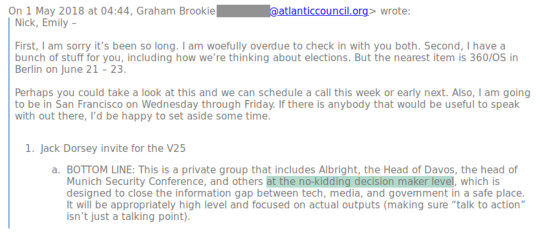
Similar correspondence to and from DFRLab and Twitter outlined early efforts to bring together as partners groups that traditionally served as watchdogs of one another. Perhaps more even than the World Economic Forum meetings at Davos or gatherings of the Aspen Institute in the US, the Atlantic Council 360/OS confabs are as expansive a portrait of the Censorship-Industrial Complex as we’ve found collected in one place.
In October 2018, DFRLab was instrumental in helping Facebook identify accounts for what became known as “the purge,” a first set of deletions of sites accused of “coordinated inauthentic behavior.” Facebook in its announcement of these removals said it was taking steps against accounts created to “stir up political debate,” and the October 2018 “purge” indeed included the likes of Punk Rock Libertarians, Cop Block, and Right Wing News, among others. Even the progressive Reverb Press, founded by a relatively mainstream progressive named James Reader, found his site zapped after years of pouring thousands of dollars a month into Facebook marketing tools. “That’s what sticks in my craw. We tried to do everything they suggested,” Reader said then. “But now, everything I worked for all those years is dead.”
In the years since, DFRLab has become the central coordination node in the Censorship Industrial Complex as well as a key protagonist in the Election Integrity Partnership and the Virality Project. Its high-profile role at RightsCon, the biggest civil society digital rights event on the calendar, should concern human rights and free expression activists.
According to their London 2019 event “360/OS brings together journalists, activists, innovators, and leaders from around the world as part of our grassroots digital solidarity movement fighting for objective truth as a foundation of democracy.” Their Digital Sherlocks program aims to “identify, expose, and explain disinformation.” But DRFLabs are more Inspector Gadget (or double agents) than Sherlock Holmes. The Twitter Files reveal DFRLab labeled as “disinformation” content that often turned out to be correct, that they participated in disinformation campaigns and the suppression of “true” information, and that they lead the coordination of a host of actors who do the same.
Twitter Files #17 showed how DFRLab sent Twitter more than 40,000 names of alleged BJP (India’s ruling nationalist party) accounts that they suggested be taken down. DFRLab said it suspected these were “paid employees or possibly volunteers.” However as Racket’s Matt Taibbi noted, “the list was full of ordinary Americans, many with no connection to India and no clue about Indian politics.” Twitter recognized there was little illegitimate about them, resulting in DFRLab pulling the project and cutting ties with the researcher.
Twitter Files #19 further revealed DFRLab was a core partner in the Election Integrity Partnership (EIP), which “came together in June of 2020 at the encouragement of the U.S. Department of Homeland Security’s Cybersecurity and Infrastructure Security Agency, or CISA” in order to “fill the gaps legally” that government couldn’t. As a result, there are serious questions as to whether the EIP violated the US First Amendment.
DFRLab was also a core partner on the Virality Project, which pushed its seven Big Tech partners to censor “stories of true vaccine side-effects.” The Stanford Internet Observatory, which led the project, is now being sued by the New Civil Liberties Alliance for its censorship of “online support groups catering to those injured by Covid vaccines.” Debate as to the frequency of serious adverse events is ongoing, however. The German health minister put it at 1 in 10,000, while others claim it is higher.
The Virality Project sought to suppress any public safety signals at all. The Stanford Internet Observatory is also at the moment reportedly resisting a House Judiciary Committee subpoena into its activities.
TwitterFiles #20 revealed some of the Digital Forensic Lab’s 2018 360/0S events, which brought together military leaders, human rights organizations, the Huffington Post, Facebook and Twitter, Edelman (the world’s biggest PR firm), the head of the Munich Security Conference, the head of the World Economic Forum (Borge Brende) a former President, Prime Minister and CIA head, intel front BellingCat and future Nobel Peace Prize winner Maria Ressa, all to combat “disinformation.” We can now reveal more.
Introducing the Atlantic Council
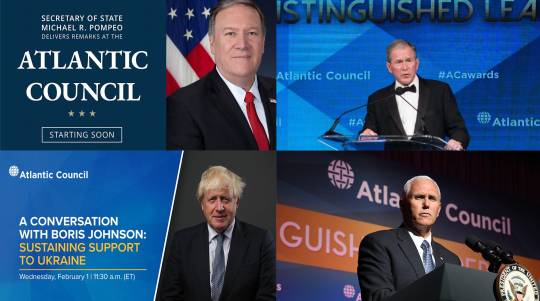
The Atlantic Council is a NATO-aligned think tank established in 1961. Its board of directors and advisory board are a Who’s Who of corporate, intelligence and military power, including:
James Clapper – former Director of National Intelligence whose tenure included overseeing the NSA during the time of the Snowden leaks. Asked whether intelligence officials collect data on Americans Clapper responded “No, sir,” and, “Not wittingly.” Clapper also coordinated intelligence community activity through the early stages of Russiagate, and his office authored a key January 2017 report concluding that Russians interfered in 2016 to help Donald Trump. Clapper has been a 360/OS attendee.
Stephen Hadley, United States National Security Advisor from 2005 to 2009 (also a 360/OS attendee)
Henry Kissinger, former US Secretary of State who oversaw the carpet bombing of Vietnam, among other crimes against humanity
Pfizer CEO Anthony Bourla
Stephen A. Schwarzman, Chairman, CEO, and Co-Founder, The Blackstone Group
Meta’s President for Global Affairs, Nick Clegg
Richard Edelman, CEO of the world’s largest PR firm (and 360/OS attendee)
The Rt. Hon. Lord Robertson of Port Ellen, Former Secretary General of NATO
Ambassador Robert B. Zoellick, Former President of the World Bank
Leon Panetta, former US Secretary of Defense & CIA Director. Panetta oversaw the US’s massive growth in drone strikes.
John F. W. Rogers. Goldman Sachs Secretary of the Board
Chuck Hagel, chairman of the Council, sits on the board of Chevron and is also a former US Secretary of Defence.
The Atlantic Council raised $70 million in 2022, $25 million of which came from corporate interests. Among the biggest donors were: the US Departments of Defense State, Goldman Sachs, the Rockefeller Foundation, Craigslist founder Craig Newmark, Google, Crescent Petroleum, Chevron, Lockheed Martin, General Atomics, Meta, Blackstone, Apple, BP, eBay founder Pierre Omidyar, Raytheon, ExxonMobil, Shell, Twitter, and many more. Ukraine’s scandal-ridden energy company, Burisma, whose links to Hunter Biden were suppressed by the August 2020 table-top exercise coordinated by the Aspen Institute, also made a contribution. You can view the full 2022 “honor roll” by clicking here.
The Atlantic Council is the Establishment, though many suffer from the delusion that in putting on a “Digital Sherlock” cape, they’re somehow with the rebel alliance. The opposite is true. The Atlantic Council and DFRLab don’t hide their militarist affiliations. This week’s OS/360 event at RightsCon Costa Rica runs together with a 360/OS at NATO’s Riga StratCom Dialogue, which DFRLab note they have “worked closely with” “since 2016.”
The Birth of the Digital Forensic Research Lab

DFRLab was founded in 2016, and has been a major catalyst in expanding the “anti-disinformation” industry. Among non-governmental entities, perhaps only the Aspen Institute comes close to matching the scope, scale and funding power of DFRLab. DFRLab claims to chart “the evolution of disinformation and other online and technological harms, especially as they relate to the DFRLab’s leadership role in establishing shared definitions, frameworks, and mitigation practices.”
Almost $7 million of the Atlantic Council’s $61 million spent last year went to the DRFLabs, according to their 2022 annual financial report. Through its fellowship program, it has incubated leading figures in the “disinformation” field. Richard Stengel, the first director of the Global Engagement Center (GEC), was a fellow. GEC is an interagency group “within” the State Department (also a funder of the Atlantic Council), whose initial partners included the FBI, DHS, NSA, CIA, DARPA, Special Operations Command (SOCOM), and others. GEC is now a major funder of DFRLab and a frequent partner:

In this video, Stengel says, “I’m not against propaganda. Every country does it, they have to do it to their own population, and I don’t think it’s that awful.”
Stengel was true to his word, and apart from DFRLab, the GEC funded the Global Disinformation Index, which set out to demonetize conservative media outlets it claimed were “disinformation.” (See 37. in the censorship list) He thought the now-disgraced Hamilton68 was “fantastic.” In total, GEC funded 39 organizations in 2017. Despite Freedom of Information requests, only 3 have been made public to date. Roughly $78 million of GEC’s initial $100 million budget outlay for fiscal year 2017 came from the Pentagon, though the budgetary burden has shifted more toward the State Department in the years since.
The Global Engagement Center was established in the last year of Barack Obama’s presidency, via a combination of an executive order and a bipartisan congressional appropriation, led by Ohio Republican Rob Portman and Connecticut Democrat Chris Murphy. The GEC was and remains virtually unknown, but reporting in the Twitter Files and by outlets like the Washington Examiner have revealed it to be a significant financial and logistical supporter of “anti-disinformation” causes.
Though tasked by Obama with countering “foreign state and non-state propaganda and disinformation efforts aimed at undermining United States national security interests,” its money has repeatedly worked its way back in the direction of policing domestic content, with Gabe Kaminsky’s Examiner reports on the GDI providing the most graphic example.
GEC frequently sent lists of “disinformation agents to Twitter.” Yoel Roth, former head of Trust and Safety referred to one list as a “total crock.” Roth is now a member of DFRLab’s Task Force for a Trustworthy Future Web. Let’s hope he brings more trust than Stengel. You can read more on GEC’s funding here.
Other DFRLab luminaries include Simon Clark, Chairman of the Center for Countering Digital Hate (a UK “anti-disinformation” outfit that aggressively deplatforms dissidents), Ben Nimmo (previously a NATO press officer, then of Graphika (EIP and the Virality Project partners) and now Facebook’s Global Threat Intelligence Lead), and Eliot Higgins of Bellingcat. Bellingcat has an ominous reputation, which it’s earned in numerous ways, including its funding by the National Endowment for Democracy (see Glenn Greenwald’s recent report and Aaron Maté’s here). Most recently, Bellingcat assisted in the arrest of the 21-year-old Pentagon leaker, further speeding up the abandonment of the Pentagon Papers Principal where the media protected, rather than persecuted, leakers. Bellingcat was part of 360/OS backroom meetings with former intel chiefs, the head of Davos and the Munich security conference among many others, as we will see soon.
As noted in the introduction, DFRLab itself has made several wrong calls on “disinformation.” In one report they highlighted “outright false narratives,” which focused mainly on the notion that Covid was an engineered bioweapon, but lumped in the “unverified” claim Covid was the “result of a lab accident.” A lab accident is now the preferred hypothesis of the US Department of Energy, the FBI, and many others. To the DFRLab it was “disinformation” and a “conspiracy theory.”
The Election Integrity Partnership and the Virality Project
DFRLab were core partners on two of the most influential “anti-disinformation” initiatives of recent times.
The Virality Project built on the EIP and had partnerships with Twitter, Facebook, Instagram, Youtube, Google, TikTok and more to combat vaccine “misinformation.” Stanford and DFRLab partnered with the University of Washington’s Center for an Informed Public, Graphika, NYU Tandon School of Engineering and Center for Social Media and Politics, and the National Congress on Citizenship. Through a shared Jira ticketing system they connected these Big Tech platforms together, with Graphika using sophisticated AI to surveil the online conversation at scale in order to catch “misinformation” troublemakers.
VP went far beyond any kind of misinformation remit, most infamously recommending to their Big Tech partners that they consider “true stories of vaccine side effects” as “standard misinformation on your platform.”

A Virality Project partner called the Algorithmic Transparency Initiative (a project of the National Congress on Citizenship) went further. Their Junkipedia initiative sought to address “problematic content” via the “automated collection of data” from “closed messaging apps,” and by building a Stasi-like “civic listening corps,” which in recent years has taken on a truly sinister-sounding mission. The current incarnation might as well be called “SnitchCorps,” as “volunteers have an opportunity to join a guided monitoring shift to actively participate in monitoring topics that disrupt communities”:
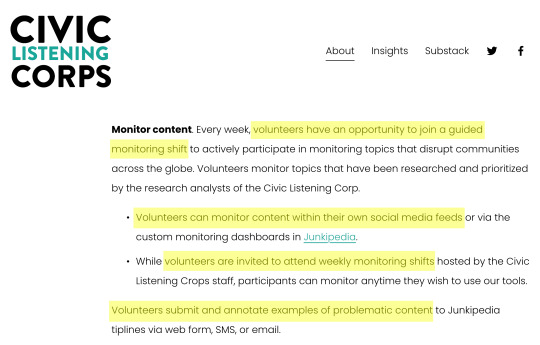
Garret Graff, who oversaw the Aspen Hunter Biden table-top exercise, was chairman of that same National Congress on Citizenship when they collaborated on the Virality Project. Both EIP and VP were led by Renee DiResta of the Stanford Internet Observatory, a former CIA fellow who engineered the now disgraced New Knowledge initiative, which developed fake Russian bots to discredit a 2016 Alabama senate race candidate, as acknowledged by the Washington Post. You can read Racket’s previous work on the Virality Project here.
DFRLab are the elite of the “anti-disinformation” elite. They work closely with a wide range of actors who have participated in actual disinformation initiatives. Here they’re invited to an elite Twitter group set up by Nick Pickles of “anti-disinformation” luminaries First Draft, also participants in the Hunter Biden laptop tabletop, and the Alliance for Security Democracy, part of the RussiaGate Hamilton68 disinformation operation.
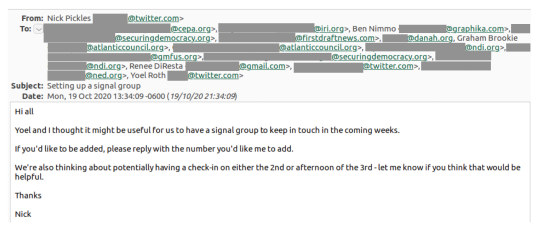
360/OS
The 360/OS event marries this tarnished record with the financial, political, military, NGO, academic and intelligence elite. Some of this is visible through publicly available materials. Twitter Files however reveal the behind the scenes, including closed door, off-the-record meetings.
“I’ve just arrived in Kyiv” Brookie notes in 2017, as he seeks to line up a meeting with Public Policy Director Nick Pickles as they discuss Twitter providing a USD $150K contribution to OS/360 (seemingly secured), and to garner high level Twitter participation.
Pickles is visiting DC and Brookie suggests he also meet with the GEC and former FBI agent Clint Watts of Hamilton 68 renown. “Happy to make those connections,” he chimes.
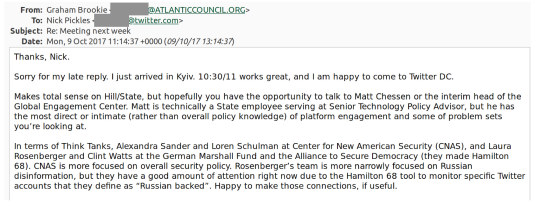
360/OS events are elite and expensive — $1 million according to Brookie — so closer collaboration with Twitter, especially in the form of funding, is a high priority.

Twitter offers $150,000:
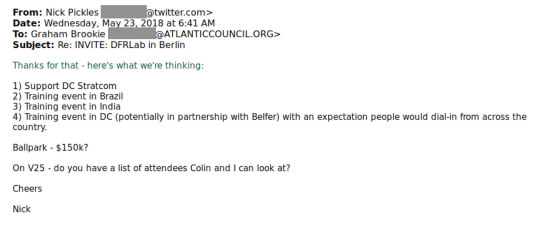
When Brookie mentions the attendees at the “no-kidding decision maker level” he isn’t kidding. Parallel to the 360/OS public program is the much more important off-the-record meeting of “decision makers ranging from the C-Suite to the Situation Room.” Here, he is explicit about a convening of military and financial power. Vanguard 25 is presented as a way to “create a discreet and honest way to close the information gap on challenges like disinformation between key decision makers from government, tech, and media.”

The document boasts of its high-level participants:

More are revealed in email exchanges, including Madeleine Albright and the head of the WEF:

They go on to list a bizarre mishmash of media leaders, intelligence officials, and current or former heads of state:

It appears Germany’s Angela Merkel was out of reach in the end, but many of the others attended this behind the scenes meeting on “disinformation.” Who are they?
Matthias Dopfner – CEO and 22% owner of German media empire Axel Springer SE, the biggest media publishing firm in Europe
Borge Brende – head of the World Economic Forum and former Norwegian foreign minister
Toomas Hendrick Ilves – former President of Estonia who co-chairs the World Economic Forum’s Global Futures Council on Blockchain Technology. Hendrick is also a fellow at the Freeman Spogli Institute for International Studies (where the Stanford Internet Observatory is housed) and is on the advisory council of the Alliance for Securing Democracy, of Hamilton 68 renown.
Chris Sacca – billionaire venture capitalist
Mounir Mahjoubi – previously Digital Manager for President Macron’s presidential campaign, and former Chairman of the French Digital Council
Reid Hoffman – billionaire and Linkedin co-founder
Ev Williams – Former CEO of Twitter and on the Twitter board at the time
Kara Swisher – New York Times opinion writer, who founded Vox Media Recode
Wolfgang Ischinger - Head of the Munich Security Conference
Aleksander Kwasniewski – Former President of Poland. Led Poland into NATO and the EU.
Richard Edelman – CEO of the largest PR company in the world
Elliot Shrage – previously Vice-President of Public Policy at Facebook (DFRLab had election integrity projects with Facebook)
Lydia Polgreen – Huffington Post Editor in Chief
Jim Clapper – former US Director of National Intelligence
Maria Ressa – co-founder of Rappler and soon to be winner of the Nobel Peace Prize
JK Rowling was also invited to give an award, though appears she didn’t make it in the end:

Why would such a group all gather specifically around the question of “disinformation”? Is disinformation truly at such a level that it requires bringing together the world’s most popular author with military and intelligence leaders, the world’s biggest PR company, journalists, billionaires, Big Tech and more? Or is this work to build the case that there is a disinformation crisis, to then justify the creation of a massive infrastructure for censorship? A glimpse of the agenda offers clues:

Here the head of the most important military and intelligence conference in the world (Munich) sits down in a closed door meeting with a former Secretary of State and the Executive Vice-Chair of the Atlantic Council.

Which is followed by a closed door session with the Editor-in Chief of the now-defunct Huffington Post and peace-maker Maria Ressa who presented to the same group of military, intelligence, corporate and other elites. Is the role of a journalist and Nobel laureate to work behind closed doors with militarists and billionaires, or to hold them to account?
At 2022’s OS/360 at RightsCon Ressa conducted a softball interview on disinformation with current US Secretary of State Anthony Blinken. In testimony last April 2023, former CIA deputy director Michael Morrell stated that Blinken “set in motion the events that led to the issuance of the public statement” by more than 50 former intelligence officials that the Hunter Biden laptop had “all the classic earmarks of a Russia information operation.”
The Twitter Files also revealed that in August 2020 the Aspen Institute organized a table-top exercise to practice how best to respond to a “hack and leak” of a Hunter Biden laptop. The laptop only came to light however two months later. In attendance was First Draft (now the Information Futures Lab), the New York Times, Washington Post, Rolling Stone, CNN, Yahoo! News, Facebook, Twitter and more. Here, DFRLab head Graham Brookie speaks with the Aspen Institute’s Garret Graff, who coordinated the Hunter Biden tabletop exercise.
After it turned out the Hunter Biden laptop was real, and the disinformation operation was more appropriately described as having been led by the likes of Blinken and the Aspen Institute. The appropriate response is apparently for RightsCon, DFRLab, Blinken and Ressa to put on a nice forum to promote these figures as “anti-disinformation” leaders.
youtube
Former DFRLab fellow and intel front Bellingcat founder Eliot Higgins is also invited to the closed door sessions with a former head of the CIA, a former Prime Minister and a President. How do you keep power accountable when you are in the same cozy club? This theme runs throughout. Bellingcat is featured heavily at the public sessions also:
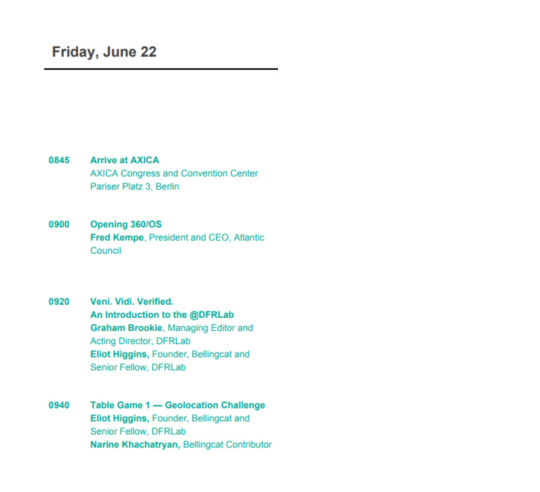
Higgins has a unique way of expressing himself online, given the DFRLab emphasis on striking out against divisiveness:
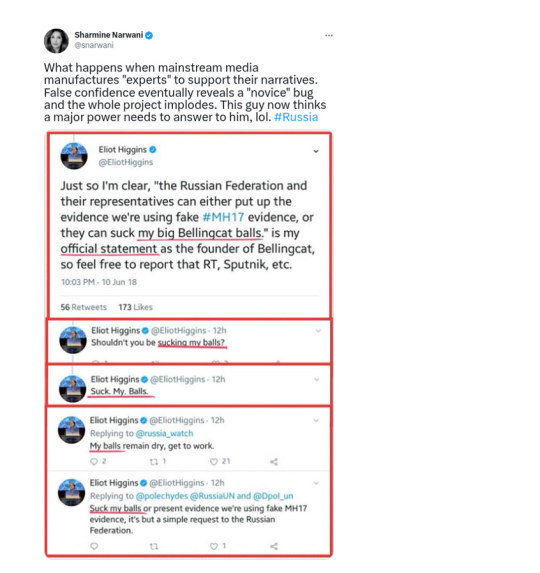
Would this pass RightsCon’s code of conduct? If not, he appears to be good enough for DFRLab to promote.
On the public side, we see Amnesty International participating to further collapse the distinction between those who are meant to hold power to account, and the powerful themselves. The Iraq war gave us embedded journalists, and the “anti-disinformation” field gives us embedded digital rights activists.

The Department of Homeland Security’s Chris Krebs also joined the closed door session. Krebs was Co-Chair of the Aspen Institute’s Commission on Information Disorder. Other members included Prince Harry, the Virality Project’s Alex Stamos (Stanford Internet Observatory) and Kate Starbird (University of Washington and previous 360/OS participant), Katie Couric, and more. Craig Newmark attended as an observer.
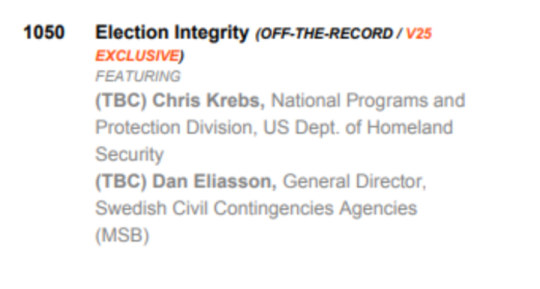
Meanwhile Renee DiResta, former CIA fellow and Stanford Internet Observatory Research Director, presented with the former Prime Minister of Sweden. This was years before she would launch the Virality Project, and take on the bugbear of “true stories of vaccine side effects.”
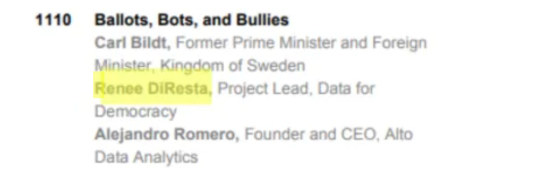
The President of the Atlantic Council participated in an “off-the-record, “ behind closed doors conversation on “trust” with the CEO of the world’s biggest PR firm, Edelman.
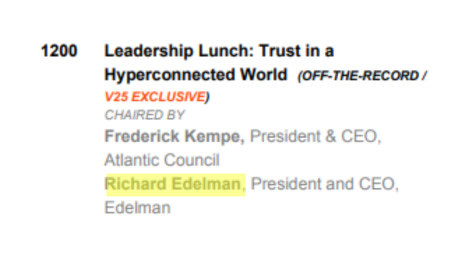
“Public relations” and “trust” may well be opposites, and trust is being destroyed not by the disinformation street crime that these groups claim to target, but by the disinformation corporate crime protected by, or in some cases created by these same people. Disinformation is real, but its biggest purveyors are governments and powerful corporate interests.
DFRLab and RightsCon show just how far the capture of civil society by elite interests has come. Again, I made a mistake helping to co-organize RightsCon in 2015. The jumping in bed with the government and Big Tech was arguably there in 2015, though to a much lesser degree. It now partners with militarists in the form of the Atlantic Council and is an enabler of the “disinformation” grift that is so deeply impacting freedom of speech and expression.
The air-gaps that should separate civil society, media, military, billionaires, intelligence and government have collapsed, and many of these actors have formed a new alliance to advance their shared interests. If weapons manufacturers funding human rights is considered legitimate then where is the red line? Effectively, there is none.
This collapse however has also been pushed by funders, who have been proactive in asking NGOs to collaborate more with Big Tech and government - something I successfully resisted for my almost 18 years at EngageMedia, critically RightsCon was the only time I let my guard down.
The RightsCon sponsor matrix wouldn’t be out of place at NASCAR:
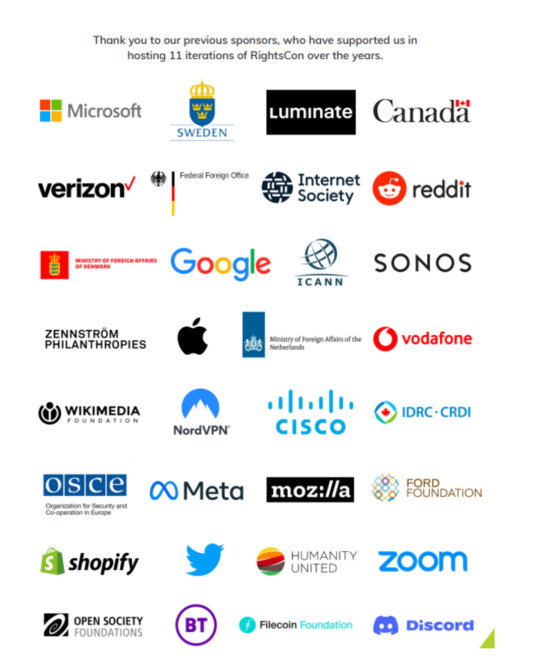
This is the equivalent of hosting a Climate Change conference sponsored by Shell, BP, Chevron, and ExxonMobil. How do you keep power accountable when Big Tech pays your wage? The “let’s all work together” approach has failed. The weakest partner, civil society, got captured and we lost. Many more lost their way and have acquiesced to and often enabled much of the new censorship regime.
A renewed and much more independent digital rights movement, with a strong commitment to freedom of expression, is well overdue.
Note: A previous version of this article mistook Blackstone for Blackwater. This has been corrected.
#rightscon#360/OS#twitter#twitter files#censorship#digital censorship#internet censorship#censorship industrial complex#atlantic council#DFRLAB#covid vaccines#virality project#NATO#propaganda#global engagement center#bellingcat#civic listening corps#world economic forum#stanford internet observatory#big tech#hunter biden#aspen institute#amnesty international#Youtube
2 notes
·
View notes
Text

#european council on refugees and exiles#atlantic route#spain#canary islands#refugees#migrants#migrant deaths#unaccompanied minors#balearic islands#frontex
0 notes
Text
Being seen, a prize draw, and my video
I had such fun seeing everyone last Wednesday when I did my reading – it was a good time and even my son seemed to think I hadn’t embarassed myself, which was a good thing. He is my ultimate judge. The video is linked here, but you can also click through to the Somewhat Grumpy Press Youtube site to see it. I trust my publisher in his infinite wisdom for doing that…Many thanks again to the…

View On WordPress
#Bib & Tucker#Canada Council for the Arts#historical fiction#Museum of Health Care#publishing#Romance Writers of Atlantic Canada#Somewhat Grumpy Press#Spit & Polish#Writer&039;s Union of Canada#Writing#writing historical fiction
0 notes
Text
A group of scientists warned Monday of the greatly underestimated risk of a collapse of ocean currents in the Atlantic which could have catastrophic consequences for the Nordic countries as the region's leaders gathered in Iceland. In an open letter addressed to the Nordic Council, which is meeting this week in Iceland's capital Reykjavik, the scientists said they wanted to bring attention "to the serious risk of a major ocean circulation change in the Atlantic."
Continue Reading.
#Science#Environment#Climate Crisis#Global Warming#Atlantic Ocean#AMOC#Atlantic Meridional Overturning Circulation
245 notes
·
View notes
Note
hai hai haii bangchan + mamacita 👀
﹙ 🪐 ﹚
☾ ━━━━━━ 𝐦𝐚𝐦𝐚𝐜𝐢𝐭𝐚



☾ ━━━ PAIRING: BANG CHAN X READER ☾ ━━━ CONTENT: MAFIA!AU, MAFIA BOSS! CHAN, MISOGYNY, GUNS, ORAL (F. REC), FACE RIDDING, UNPROTECTED SEX, ☾ ━━━ WC: 1.2K ☾ ━━━ NOTE: not me listening to MAMACITA when you sent that hbjad ☾ ━━━ send me Chase Atlantic songs and a member to write a blurb about ☾ ━━━ 18+ work!! minors and ageless/blank blogs DNI! you will be blocked, put an indicator on your blog somewhere that you are 18+ before interacting with this work/blog

The only person Chan trusted more than his seven friends was his girlfriend. Especially when he needed to give people a little push. Maybe because she was just the right level of crazy to date— let alone join his gang— a mafia boss.
He had her on his arm at a banquet for the underground world. Security was tight for the event and Chan knew coming in, he was fine if someone tried something. Y/n stuck close to him the whole time. Her arm wrapped with his while she held a glass of champagne in the other. He watched how many other men looked at her as they walked by. It boosted his ego more.
“Mr. Bang! How nice to meet you finally!” Something he’d heard all night
“Mr. Lee. It’s nice to meet you as well,” Chan greeted the target, being the cordial businessman he was.
It wasn’t long before more men he’d spoken to over the phone had joined his conversation, including some sons who were due to take over their father’s spot. He’d proudly introduced Y/n as his girlfriend to the group when asked. Y/n smiled and gave a small wave to the group.
“How do you manage to pick up such a pretty lady Mr. Bang?” One of the sons asked
“Pure luck,” Chan answered
“You have her well trained. Been quiet as a mouse all night.” Mr. Lee joked causing the other men to laugh
“Maybe you’re just not worth speaking to Mr. Lee. Your fourth wife seems to think so at the moment,” Y/n smiled as she sipped her drink
“Excuse me?” Mr. Lee looked shocked
“Obviously not trained enough,” Another remarked
“You let her speak this way, Mr. Bang?”
“I prefer she does,” Chan smiled
Chan didn’t worry about his girlfriend mouthing off. He’d thought it was attractive to watch her do it to others. It’s how things seemed to get done.
“And you’re the current head of the underworld bosses? Can’t believe you have such a mou—”
“You can finish that sentence if you prefer glass in your throat,” Y/n interrupted
The look in her eyes alone kept the men silent for a moment.
“I believe the council will need to discuss our leadership now,” Mr. Lee said
“You’re just looking for an excuse to take out Chan, Mr. Lee.”
“I most certainly am not!”
“It’s really amazing what a few high ranking members of your family will say with a good drink and a pretty face in front of them.”
“I beg you’re pardon?”
“Then get on your knees and beg.”
Y/n watched as he reached behind and pulled out a gun. Point it at her, which just made security— all who worked for her boyfriend— pull theirs out and surround the group.
“Thank you, for showing you’re true colors, Mr. Lee. If any of you would like to join Mr. Lee, please feel free too. But let this be a warning not to question my leadership.” Chan smiled
One of the security guards grabbed the gun from the man while he was escorted to a different room.
“You let yourself get—” one of the sons started speaking put was cut off by Y/n’s champagne flute colliding with his head
“Deal with them,” Chan sighed and escorted his girlfriend out of the room. Bringing her back home and carrying her up to their room.
“Chan!” Y/n squealed
“What?” He laughed as he walked up the stairs
“I can walk.”
“Mm, but I know you’re feet hurt from those heels baby.”
Chan opened their bedroom door before setting her on the bed and kneeling infront of her. He quickly slipped her heels off and set them in their closet. Y/n smiled as he turned back to her. “I’m so glad I get to call you mine,” Chan said as he crawled over her and pressed his lips to hers.
Y/n moaned into his mouth and pushed his blazer off his shoulder. Their hands roamed the other’s body, pulling off the fabric of the clothing. Tossing them somewhere in the room for someone to deal with later. Y/n managed to get her boyfriend on his back as she grinded herself against him.
“Let me prep you baby girl,” Chan said as she kissed down his neck
“Let me ride that pretty face tonight?” Y/n asked
“Whenever. Get up here.”
Y/n moved up his frame. Wet pussy hovering over his face before he pulled her down to his mouth. Tongue sliding into her and coating her walls with his saliva. Y/n grabbed onto their headboard. Rolling her hips against his face, nose hitting her clit while his hands gripped her ass.
Y/n moaned into the large room. The tip of his nose hitting her clit with each roll of her hips. “Channie.”
Chan moaned into her as his hands had migrated to her hips and helped her rock against him. Her moans were muffled from him by her thighs. Her legs got tighter around his head with each swip of his tongue and nose.
“Need you inside, Channie,” Y/n moaned
Y/n peered down at him. Eyes closed as he ate her out. Enjoying the taste of her to the fullest. Chan kept her flush against him as she whined. The knot in her stomach tightening with each motion. Y/n moved her hands to grip his wrists. Holding on to him as he orgasm washed over her. A loud moan ripping from her throat.
Chan helped her through the high he set off before letting her off his face. Y/n sat up a bit and caught her breath as he moved her back over his hard cock. Y/n lifted his leaky dick from his stomach, positioning his tip at her entrance, and slowly sinking down. Chan held her hips as she sat down on him. Watching her head roll back as she took his size.
“Such a good girl for me,” Chan praised her
“Only you,” Y/n hummed as she placed her hands on his chest.
Slowly she started bouncing along his shaft. Chan took in the sight of her. Just like he always did in bed. His hands caressed her sides as she squeezed him just right.
His hands grabbed her hips again as she picked up her pace. Helping her bounce on him as her nails left crescents into the skin. Dragging her nails down his chest. Chan moaned under her as she smiled down at him. Dick twitching inside as she clenched around him for fun. Rolling against him as Chan tilted his head back into the pillow.
“Fuck baby. ‘M close,” Chan moaned
“Fill me up Channie. Pretty please.” Y/n begged
“Whatever you want.” Chan sat up and pressed his lips to hers.
Y/n wrapped her arms around his shoulders. Her tongue slipping into his mouth and playing with his tongue as his hands gripped her hips tighter. Burying himself inside her as his orgasm washed over him. Whimpering into her mouth as she tried rolling her hips against him.
He flipped her onto her back, leaning down to her neck, “You’re turn baby.”

☾ ━━━━━━ M.LIST TIP JAR
☾ ━━━ please support writers by reblogging and/or leaving feedback
☾ ━━━ 𝐓𝐀𝐆𝐒: @lakoya @lilyuwon @jaiuneamesolitaiire @caitlyn98s @gimmeurtummy
@innieandsungielover @rylea08 @20crowsinahoodie @kpopsstuffs @moonlight-the-writer
@seungmonggg @fearnotfimmie @the-sweetest-rose @stars-garden @bandolls
@asahisimpnation @vegetablesarefuntables @bl00dyv3inss @skzbiasot8 @chanssmiles
@avyskai @kangyeonie @ninisoul-space @dessianna1 @kibs-and-bits
@aaliyaoaoah @palindrome969 @realrintaro @tinyelfperson @minhwa
@redstayrosie @caravm @armystay89 @skzhoes @kiko-o-luck
@cookiesandcreammy @alice-went-away @boldy-49 @chrizzztopherbang @rockstarkkami
@wh0re4mingi @rhonnie23 @hrskt @emollvvr-blog @tinys0ftie
@soulphoenix1618 @highkeyinlovewithhanjisung @nahitzstacyy @palindrome969 @thatgirlkay
© 2024 MINNIESMUTT. DO NOT COPY, REPUBLISH OR TRANSLATE MY WORK ANYWHERE
#☾━━━━ [𝐊𝐀𝐑𝐌𝐀 𝐖𝐑𝐈𝐓𝐄𝐒]#☾━━━━ [ 🪐 𝐀𝐍𝐎𝐍𝐍𝐈𝐄]#stray kids#stray kids x reader#skz x reader#stray kids x reader smut#skz x reader smut#skz smut#stray kids smut#bang chan x reader#bang chan x reader smut#bang chan smut#bang chan hard hours#bang chan hard thoughts
405 notes
·
View notes
Text



Access Denied: The Inaccessible Island Rail
The Inaccessible Island rail (Laterallus rogersi) is a rarely seen member of the rail family, Rallidae. Part of the reason for its obscurity is the place in which it resides: Inaccessible Island, part of the Tristan da Cunha archipelago in the southern Atlantic Ocean. These islands are extremely remote, and until 2019 it was unclear how L. rogersi even came to be there. We now know that the species colonized the island some 1.5 million years ago, originally coming in from South America and subsequently losing its ability to fly.
In addition to its unique evolutionary history, the Inaccessible Island rail's greatest claim is that it is the smallest flightless bird in the world. Individuals weigh between 35 to 49 g (1.2–1.7 oz) and can be 13 to 15.5 cm (5.1–6.1 in) long from beak to tail. Members of both sexes are dark brown with red eyes; some may have white striping along the underbelly or wings. Females tend to be slightly smaller and lighter in color than males.
The Inaccesible Island rail can be found on all habitats on the island in which it inhabits; these include low mountains and fern brush though the species is most abundant in the grasslands that grow close to the rocky shore. Within these habitats, L. rogersi is largely diurnal. They freely forage for invertebrates, including earthworms, beetles, and moths, as well as seeds and berries; as they have no natural predators they have few defenses against potential threats, although they can run extremely fast when alarmed.
Adults are highly territorial, and when two rivals of either sex encounter each other they will display by lowering their heads, circling each other, and calling loudly until one of them concedes. Males and females mate for life, and build nests in the tall grass. The breeding season is between October and January, in late summer, and females lay a clutch of 2 eggs. Both parents take turns incubating the eggs until they hatch. Chicks can be vulnerable to predation by the migratory brown skua, so parents guard the nest fiercely. The time it takes for chicks to fully mature is unknown, as is the average lifespan in the wild.
Conservation status: The Inaccessible Island rail is considered Vulnerable by the IUCN. The island's population is believed to stand at about 5,600 adult birds. While the island's ecology is currently stable, researchers believe the species would be seriously imperaled if invasive species such as house mice, feral cats and brown rats were introduced. Access to the island is currently restricted, and the island has been declared a nature reserve by the Tristan da Cunha Island Council.
If you like what I do, consider leaving a tip or buying me a kofi!
Photos
Peter G. Ryan
#inaccessible island rail#Gruiformes#Rallidae#rails#birds#islands#island birds#grasslands#grassland birds#Atlantic ocean#animal facts#biology#zoology
950 notes
·
View notes
